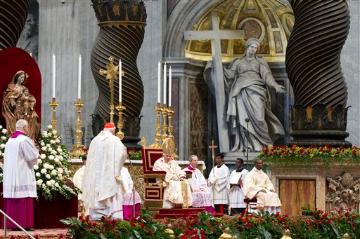
Ann Skeet is the senior director of Leadership Ethics at the Markkula Center for Applied Ethics. Views are her own.
There is an organizational culture crisis unfolding as more scandals at venerable institutions are revealed, in the Catholic Church, the U.S .Olympic Committee, and in far too many corporations to name, uncovering the abuse people have suffered at the hands of those in positions of power. We are approaching organizational anarchy that will render many entities unable to produce results of any value to any type of customer or follower.
Currently, the Catholic Church is in the crosshairs, where it has been for more than a generation as pedophiliac predators in white collars have gone unchecked by any moral, ethical, or legal authority. A colleague in a recent university discussion about sex abuse—more aptly described as rape—by Catholic priests asked pointedly where is the outrage?
In media interviews held since the Pennsylvania grand jury report revealed that more than 300 priests had raped more than 1,000 children, many commentators have touched on the changes put in place the first time this scandal broke, beginning with the Dallas Charter of U.S. Catholic Bishops in 2002. But we now can see the flaws in that charter, starting with the fact that bishops themselves were exempted from its guidelines. Sixteen years later it’s clear that the new policy was not enough. Appointing new leaders has not been enough. Widespread reporting on the topic was not enough. "We believe that the real number of children whose records were lost or who were afraid ever to come forward is in the thousands," the grand jury report says. "Priests were raping little boys and girls, and the men of God who were responsible for them not only did nothing; they hid it all. For decades. Monsignors, auxiliary bishops, bishops, archbishops, cardinals have mostly been protected; many, including some named in this report, have been promoted."
Institutional failures on grand scales have themes. Unhealthy cultures are fed by many sources. These are some bright warning lights:
- A cult of followership, where top leaders are followed with fanaticism, unchecked by outside forces
- The lack of outside forces in the first place, leading to insular, secretive organizations
- Limited regulation either because the governing bodies have no teeth, no interest, or not enough skin in the game to function well—if there is regulation at all
- A lack of diversity amongst policy-makers and people in positions of power
The Church needs to start by cleaning house, hiring outside investigators to hunt out the bad stuff, and turn people over to legal authorities, a formula offered to me by a Santa Clara alumna. Instead, she noted, the church fights to keep records closed, to keep statutes of limitations in place, and pays people off.
Another participant in the same recent university discussion reminded us all that we are the Church, not the bishops or the pope, but all of us. As the Church we must demand a total accounting of what has happened, the people involved, and the money already spent. Without that, we simply can’t move forward as a church. The people in formal leadership positions in the Church should:
- Cooperate fully with the legal authorities by turning over documents and providing evidence to prosecute rapists and those who cover for them.
- Leave legal issues to law enforcement. Develop a fully separate process to decide whether or not people can continue as priests. Anyone convicted has to go (along with those who participated in covering up these transgressions). No special “Rome assignments” for bad guys. Have a majority lay voting contingent in this process, as the clergy have proven to be incapable here.
- Institute a policy that strictly prevents non-disclosure agreements. Release the lists of past transgressors in every diocese. Secrecy got us into this mess.
- Mandate reporting to civil authorities everywhere. Fire those who should and don’t.
- Start liquidating money (Rome, too) as this is going to cost a bundle. It has and it should. Make the payments with compassion and respect, not kicking and screaming. Disclose financial costs to the flock and deal with the consequences.
There is a corollary to this no-nonsense, take-no-prisoners set of actions in just about every major institutional scandal. Too often, those in leadership positions do not react promptly and forcefully in the face of such moments, struggling with the very real ethical dilemma of trying to decide who deserves their protection—the institution or the person?
There simply is no institution, however, without people willing to be part of it. Placing the dignity and respect of every individual in every organization as its primary concern is the only way institutions can exist and thrive. The pews in too many Catholic churches on Sunday mornings suggest that the Catholic Church has failed in this most basic way.
Those in Church leadership positions might have been asking themselves, “What would Jesus do?” and decided to forgive the perpetrators of these crimes. But they also have to ask, “What would Jesus have me do now?” and deliver justice to the victims and safety to the flock. This likely means they will lose followers, and innocent parishioners may be adversely affected if their parishes’ assets are diminished. So be it. For what does it profit a man to gain the whole world and forfeit his soul? Mark 8:38
How do we remind Church leaders that its followers are also the Church? Perhaps the remaining faithful in the pews of Catholic Masses in the coming weeks should take their own knee. By kneeling through the entire Mass, lay people can show their clergy the full Church calling for transparency and change.
